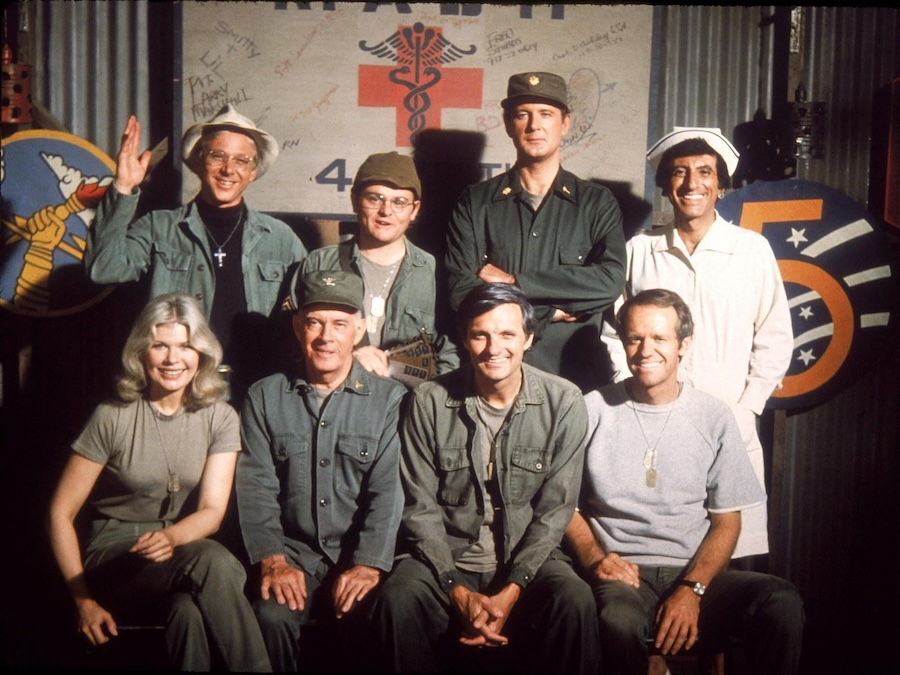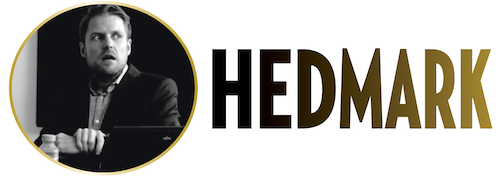ABOVE AVERAGE

One of the best-loved television shows ever, its 1983 finale, a two-and-a-half hour episode, was truly a national event. No other single program has ever attracted that large an audience in the U.S. That episode was a deeply touching end to a remarkable journey. However, in 1972 it was hard to see how the simplistic TV version of Robert Altman’s wonderful film MASH (1970) would ever become a prime-time staple.
Playing practical jokes
Just like the film, M*AS*H was set behind the frontlines in Korea where a dedicated medical staff worked at the 4077th Mobile Army Surgical Hospital. Well, some of these people were obviously less dedicated. Everybody hated the war, but surgeons “Hawkeye” Pierce (Alan Alda) and “Trapper” John McIntyre (Wayne Rogers) took it to the next level. Unable to take the military seriously, whenever they weren’t busy operating on people, they were playing practical jokes on the other doctors and bedding the nurses. Their colleague Frank Burns (Larry Linville) was usually the victim and he hated them for it. He had an affair with Major Houlihan (Loretta Swit), who went by the nickname “Hot Lips”. Colonel Henry Blake (McLean Stevenson) received many complaints about the two pranksters, but liked them too much to get rid of them.
Other regulars were Blake’s assistant Radar (Gary Burghoff), who always knew what the Colonel wanted before he knew it; Father Mulcahy (William Christopher); and Klinger (Jamie Farr) who always tried in vain to dress up as a woman to get himself discharged and sent home.
Vietnam-era audiences related to it
There were big, and successful, changes to the cast over the years. Blake was killed in a plane crash and replaced with Colonel Sherman Potter (Harry Morgan), who was much stricter than Blake, but realized that Hawkeye and Trapper were far too valuable (and fun) to discharge. Burns went AWOL and was replaced by a similar character, Major Charles Winchester (David Ogden Stiers), a sophisticated Boston surgeon who tried to maintain some form of dignity even in Korea. He also became the butt of jokes, but was much more interesting as a character than Burns. The same goes for B.J. Hunnicut (Mike Farrell), who replaced Trapper when he was finally sent home; B.J. quickly got along with Hawkeye, but suffered from severe homesickness.
All of it was shot in Hollywood, but the directors and writers of the show tried to create a realistic approach and succeeded well enough, most of the time. Vietnam-era audiences related to the whole situation with young men and women being far away from home, fighting and dying in a war for unclear purposes.
As the years went by, M*A*S*H changed fundamentally and moved closer to brilliance.
As the years went by, M*A*S*H changed fundamentally and moved closer to brilliance. Creator Larry Gelbart departed and Alda became more involved, cutting his teeth writing and directing episodes of the show. The laugh track slowly disappeared, the jokes became more sophisticated and somewhere along the line the showrunners realized that audiences knew and loved the characters enough for M*A*S*H to dare go very serious at times and deal with the horrors of war as well as what the working conditions of a field hospital do to a human mind.
It all led up to that finale, where the war ended. Hawkeye underwent psychological treatment for his mental problems, Winchester tried to help a group of Korean musicians with tragic results and B.J. and Hawkeye tried to deal with the understanding that they would probably never see each other again back home. As the choppers took off from the MASH one last time, those two were not the only ones whose hearts were broken.
M*A*S*H 1972-1983:U.S. 256 episodes. Color. Created by Larry Gelbart. Theme: ”Suicide Is Painless” (Johnny Mandel). Cast: Alan Alda (Benjamin Franklin ”Hawkeye” Pierce), Mike Farrell (B.J. Hunnicut, 75-83), Wayne Rogers (”Trapper” John McIntyre, 72-75), Loretta Swit, David Ogden Stiers (77-83), Larry Linville (72-77), Harry Morgan (75-83), McLean Stevenson (72-75), Gary Burghoff (72-75), William Christopher, Jamie Farr (73-83).
Trivia: Followed by a spin-off series, Trapper John, M.D. (1979-1986); Morgan, Farr and Christopher also returned for AfterMASH (1983-1984).
Emmys: Outstanding Comedy Series 73-74; Directing 73-74, 74-75, 75-76, 76-77; Writing 78-79; Actor (Alda) 73-74, 81-82; Actress (Swit) 79-80, 81-82; Supporting Actor (Burghoff) 76-77, (Morgan) 79-80. Golden Globes: Best Comedy Series 82, Actor (Alda) 75, 76, 80, 81, 82, 83, Supporting Actor (Stevenson) 74.
Quote: “I will not carry a gun, Frank. When I got thrown into this war I had a clear understanding with the Pentagon: no guns. I’ll carry your books, I’ll carry a torch, I’ll carry a tune, I’ll carry on, carry over, carry forward, Cary Grant, cash and carry, carry me back to Old Virginia, I’ll even ‘hari-kari’ if you show me how, but I will not carry a gun!” (Alda to Linville)
Last word: “I would love to improvise, and started out that way. I was always suggesting on the M*A*S*H set that we do some. We didn’t improvise a smidgen, every word was written. We did one show that was improvised; it was the black and white interview show. We improvised most of the speeches that were reorganized and punched up and written by Larry Gelbart. Many moments were done on the spot where the interviewer would have questions we’ve never heard before and we would answer in character.” (Alda, ScreenRant)
